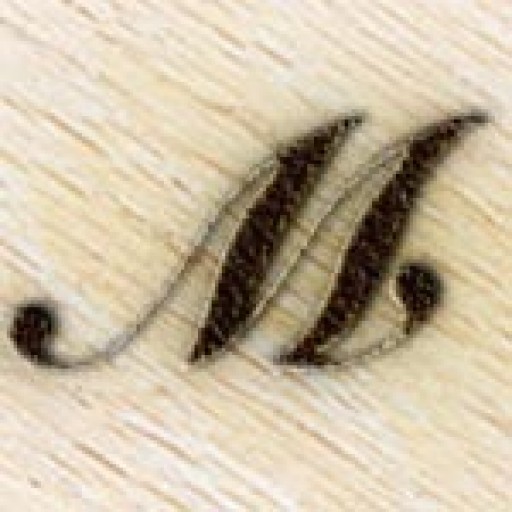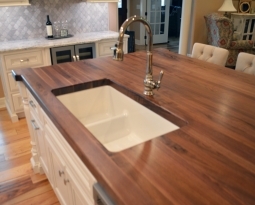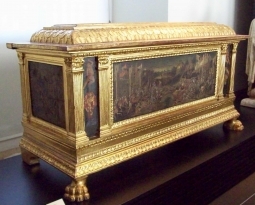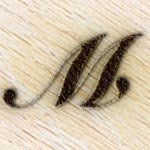
When it comes to butcher block products, there are quite a few misconceptions about the construction and durability of hardwood countertops.
With butcher block countertops rising in popularity due to the unique, natural look they offer, the McClure team is here to set the record straight about butcher blocks and other countertop surfaces. Some of the most common butcher block myths involve qualities such as water resistance, bacteria resistance, durability, and more.
Depending on how you plan to use your countertops, McClure’s custom finishes can offer different forms of protection for butcher block countertops to ensure that they remain pristine. Whether you’re looking for a water-resistant finish like McClure’s Organic Color Seal, a low-maintenance, tough coating like McClure’s Durable Acrylic, or a food-safe, bacteria-resistant finish like McClure’s Chef’s Choice, McClure can custom finish your countertop to best fit your lifestyle.
By treating butcher block countertops like any other counter material and not working directly on the surface, you’ll find that hardwood countertops stand up to other materials in a number of areas. Those include bacteria resistance, water resistance (when properly oiled), heat resistance, and ease of repairs, in addition to the fact that wood surfaces are much easier on knives and sharp cutlery. However, for those that want to dedicate an area of their countertop to prepare food directly on, hardwood countertops offer a functional space that no other material can provide due to end grain butcher block’s ease on knives and sharp cutlery. While most materials would be damaged by blades and knives, end grain butcher block’s fibers will separate and mend to preserve both cutlery and the wood surface.
1. “Butcher Blocks Harbor Germs”
This myth most likely stems from butcher block cutting boards and the fact that they cannot be washed under water or in the dishwasher. However, according to a study conducted by the Food Research Institute at University of Wisconsin (1993), wooden cutting boards have been shown to be safer than plastic ones when it comes to harboring microbes such as E-Coli, listeria and salmonella. The same applies for butcher block countertops.
Additionally, most butcher block countertops are finished with a water-resistant coating like McClure’s Organic Color Seal to ensure that moisture doesn’t seep into the surface. This mineral oil coating combined with routine maintenance should ensure that your countertop remains bacteria free.
Overall, if you can avoid working directly on your countertops like you would with any other counter material, bacteria should never be an issue in the first place.
2. “They Aren’t Water Resistant”
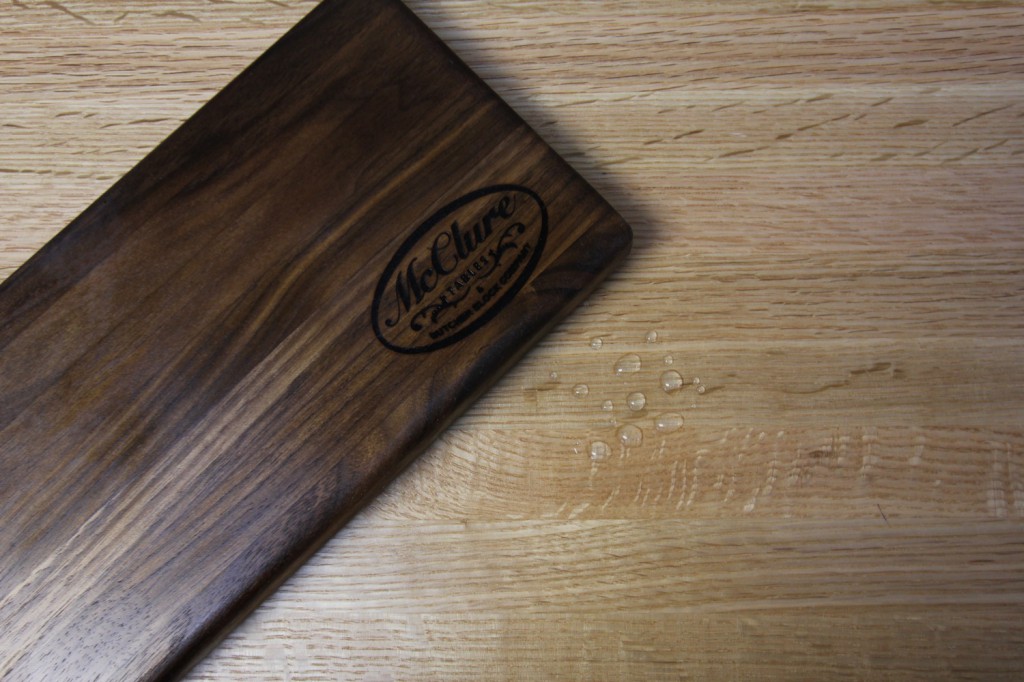
With a coating of water-resistant, food-safe mineral oil like McClure’s Organic Color Seal, water and moisture shouldn’t be a problem for butcher block countertops. Water-resistant finishes are widely available and should prevent all moisture from seeping into hardwood countertops.
With regular applications of mineral oil applied to your countertops every six months, particularly in areas surrounding a sink or faucet, your butcher block countertop will be looking like new for years to come.
3. “They Aren’t Heat Resistant”
It’s not advised to put a hot pan on your butcher block countertops, but the same goes for any other kind of countertop. Despite common belief, butcher block countertops are actually more resistant to heat than granite, and hardwood surfaces take longer to burn or char than any other countertop material.
While it’s true that butcher block countertops can be damaged by excessive heat, laminate countertops will melt or peel while stone countertops can warp under similar conditions. At least with butcher block countertops, heat marks or charring can be sanded out should they occur. Repairs for other materials are not quite so easy.
4. “Butcher Block Countertops Will Show Scratches or Damage”
By avoiding cutting directly on butcher block like you would with any other countertop material, you’ll find that butcher block is one of the most durable and rugged materials available.
However, if you’re hoping to use a dedicated area of your butcher block countertop for chopping or food preparation, coating the area with a scratch-resistant, food-safe finish like McClure’s Chef’s Choice should keep damage to a minimum. Naturally, hardwood surfaces give way to knives and sharp cutlery, leaving knives sharp and damage to the counters to a minimum as the fibers bend back and mend themselves. Though if damage does begin to show after prolonged use, wood can be easily sanded and resealed for a good-as-new look.
5. “Butcher Block Is Expensive To Maintain Or Repair”
One advantage of butcher block countertops is that they are easier to repair than any other countertop material. While butcher block countertops do require routine maintenance, resealing the surface is only required after every 6-12 months depending on the level of use. The same goes for natural stone countertops, which must be resealed over time to maintain the original quality and look.
Some finish options such as McClure’s Durable Acrylic can be used as a maintenance free option for butcher block countertops. If you don’t plan on working directly on your butcher block countertops, coating the surface with a finish like Durable Acrylic can be a great option for tough, low-maintenance countertops.
Repairing butcher block countertops is relatively painless and sanding and resealing can be done on your own. That’s quite different from laminate or stone, where self repair is typically not an option and professional repair jobs can be very expensive.
The Advantage of Butcher Block Countertops
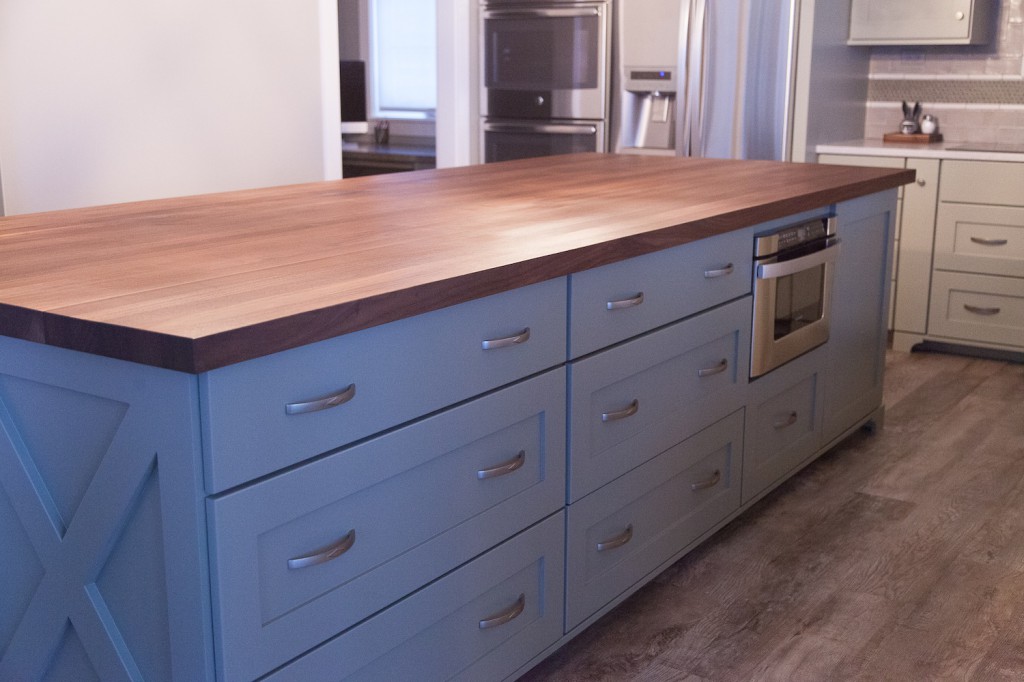
Though excessive heat, moisture, or direct contact with knives can damage butcher block countertops, the same damage, if not worse, would form on counters made from other materials.
So despite the occasional maintenance that may be needed for butcher block countertops, they’re a great option for those who love working in the kitchen. Additionally, butcher block countertops are very affordable compared to other counter surfaces, with even the thickest butcher block countertops by McClure (3 inches) priced at less than $100 per square foot.
Thinking of what butcher block countertops would look like in your home? You can find all of McClure’s premium, handcrafted butcher block countertops listed here. For a natural-looking countertop that’s sure to bring beauty and functionality to your kitchen for years to come, go with McClure.
